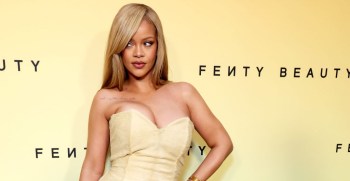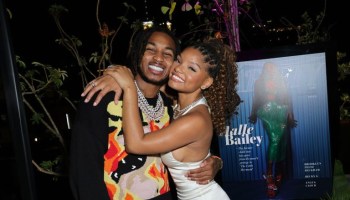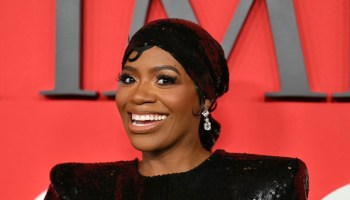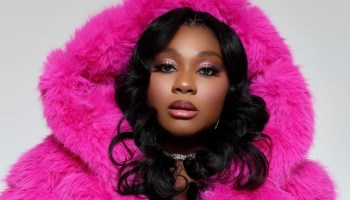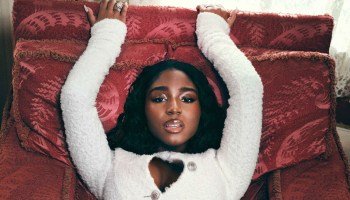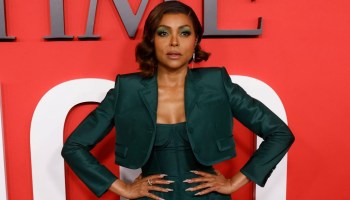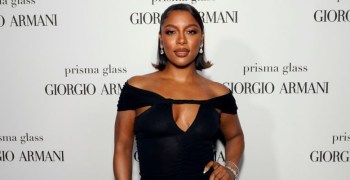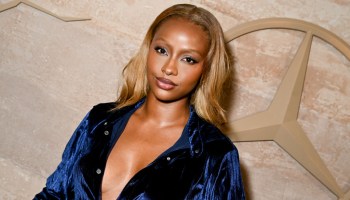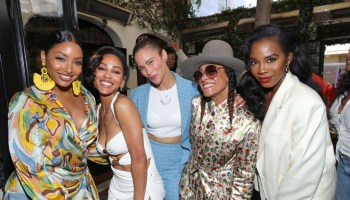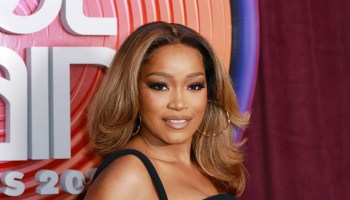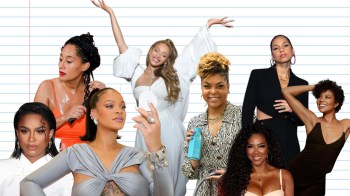They gathered in darkness. At around 5:00 am on a foggy, cool San Francisco morning, the women came to paint their bodies, and to participate in a grounding exercise before they began.
As the sun rose, they took the BART and ventured to Market and Beale. In the 7 o’clock hour, the women stood in formation, brown bodies of all builds, adorned in head wraps and shirtless, their upper halves streaked in white, blue, pink, red, and orange. Pretty like make-up. Or fierce like war paint.
They held the street for more than two hours. The words on their faces, necklines, breasts, torsos and stomachs were writ large for, by, and about black women. Some read: “I do this 4 mothers;” or “I fight for my girls to love their bodies;” or “4 the murdered, missing, silenced, abused, exploited or unseen.”
“I am my sisters’ keeper.” This is what power and love look like. #SayHerName pic.twitter.com/i3NxPBtJ6b
— BlackOUT Collective (@blackoutcollect) May 21, 2015
Alicia Bell, an organizer from Oakland, was one of the topless protesters in the #SayHerName national call to action last Thursday. She chose to wear the words “4 bodies shamed and murdered.”
Bell says that she not only wants to highlight these murdered black women, but wants to make sure that women—queer, trans and straight—are intrinsic to the leadership of the anti-racism protest movement today. Men played support roles on that day including security, holding up signs, making sure the protesters were hydrated, and liasing with the police, but the women led.
“The baring of breasts is historically an act of mourning, grief or protest. We liberated our bodies as an act of greater political liberation,” Bell told Hello Beautiful. “While we’ve witnessed entire cities rise up to resist the murders of Black men, the murders of Black women continue to go largely ignored. It’s time to remember and lift up the most marginalized victims of state brutality.”
Taking place in over 20 cities including the powerful action in San Francisco, #SayHerName seeks to uplift the names of Black women and girls killed by police, just as we hashtag and cry out the names of Trayvon Martin, Mike Brown, Eric Garner, Tamir Rice, Freddie Gray, Tony Robinson and Anthony Hill.
But who speaks the name of Michelle Cesseaux, Miriam Carey, Natasha McKenna, Yuvette Henderson, Tanisha Anderson, Kayla Moore, Shelley Frey, Latandra Ellington, Alberta Spruill, Sheneque Proctor and so many others?
Spearheaded by Charlene Carruthers, National Director of the Black Youth Project 100 (BYP 100), and partnering with groups like Black Lives Matter, the Black Out Collective, Ferguson Action and others, Carruthers says #SayHerName, was set in motion by the recent dismissal of all charges for the Chicago police officer who took 22-year-old Rekia Boyd’s life in 2012.
“Her life matters and so does the life of Black trans women like Mya Hall and 7-year old Black girls like Aiyana Stanley-Jones,” says Carruthers. “The story of what police violence means and who it impacts in America must change. We refuse to allow this generation’s movement narrative to claim a sense of leadership and an absence of the full story of how Black people experience oppression.”
#SayHerName is not only ringing bells in the streets but in academia as well. In solidarity with the planned actions last week, Dr. Kimberle Crenshaw’s African American Policy Forum, in conjunction with the Center for Intersectionality and Social Policy at Columbia University and Soros Justice Fellow Andrea Ritchie, released #SayHerName: Resisting Police Brutality Against Black Women, a comprehensive 35-page report highlighting stories of Black women who have been killed by police.
“The #SayHerName report came about as we were participating in actions after Eric Garner,” says Dr. Crenshaw, who sped up the release of the brief to coincide with last week’s actions. “I think it’s tremendously important for Black women and girls to recognize that what happens to them is as important as what happens to their brothers and fathers and their sons.”
“Our entire history has been built on this notion of shared space. We understand that when it comes to men— that the killing, incarceration, and stereotypical representation of black men —has always been important for Black women. The same should hold true for us,” continues Dr. Crenshaw.
Andrea Ritchie, the co-author of the report, and author of Violence Everyday: Police Brutality and Racial Profiling Against Women, Girls, and Trans People of Color, has been working against police violence against Black women for the last 20 years (which she jokingly said has been like “crying into the wilderness,” although she acknowledges women like Angela Davis, Fannie Lou Hamer and Ida B. Wells, who have always fought this fight.)
Ritchie notes that Black women are often marginalized in spaces around race (where Black men’s issues are privileged) and gender (where White women’s issues are privileged).
“It’s interesting because I do a workshop where I ask the audience to say the first name that comes when it comes to police brutality. My generation says Rodney King, maybe another generation says Oscar Grant. But it’s universally a Black man,” explains Ritchie. “But when I say what’s the first image that comes to violence against women? It’s about domestic violence.”
Ritchie says that often times, the police response to violence begats more violence (so much so that Black people are loathe to call 911 for anything), yet White feminists have invested much in police being the answer to domestic violence in this country. So where does that leave Black women like Cherae Williams, who called police in a dispute with her boyfriend only to be brutally beaten by them?
“It’s clear that we as Black women have been struggling around police brutality and state violence since Harriet Tubman, but it’s sad that we can’t talk about it,” she says.
But Ritchie says she is heartened by what is now happening. “I never imagined seeing over 20 rallies dedicated to Black women,” she says. “I am deeply inspired, and I feel like we turned a corner on this issue that we’re not turning back on.”
Alicia Bell said she was also inspired after what she admittedly said was initially a “scary” action.
“It felt wonderful to stand in my power, and know that folks have my back,” she said. And as for those few ignorants who had crude comments about exposing their bodies? Bell replied, “We’re not really doing this for you. And you being the people who only want to engage in our bodies sexually and in a way of exploitation and commodification. You can see our bodies so you can see this signs.”
She said she did it for her sisters. “There were Black women who walked by and were really inspired and there were tears shed and stories told about personal experiences of being in their bodies. For survivors of rape, for survivors of sexual assault or lost children or girls, there were a lot of tears shed and conversations shared,” she recounts.
“From Oakland to New Orleans, Chicago and over to New York City, we honored our ancestors and celebrated our resiliency,” says Carruthers. “We sent a message to people who refuse to see us and seek to erase us. As Ella Baker‘s song says, we who believe in freedom cannot rest.”









